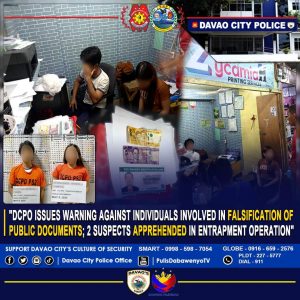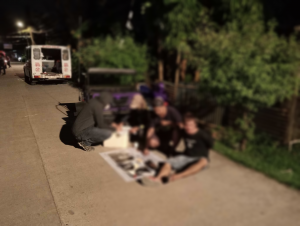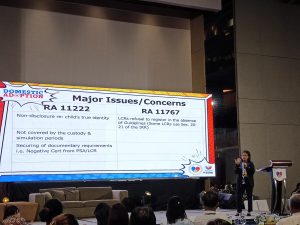Each of the 12 police stations in the city will soon have a specialized team to address incidents of cybercrimes.
Col. Noel Espinoza, the director of Anti-Cybercrime Unit XI, told reporters yesterday in the AFP-PNP press briefing held at The Royal Mandaya Hotel, that each of the units will be under the umbrella unit called the “Davao City Police Cyber Crime Response Team.”
“This program has already been presented during the conduct of the City Peace and Order Council (CPOC) meeting,” he said.
He also said Mayor Sara Duterte supports the creation of the response team to cater to the increasing number of cybercrime cases.
Last year, the unit recorded a total of 143 cases referred to their office. Of the total, they filed 36 cases, five of which were for the implementation of the warrant of arrest, four were for entrapment operation, one for the implementation of a search warrant, and two were for joint operations, along with the Women Children Protection Center (WCPC)- Mindanao Field Unit.
In 2018, he said 341were referred to their office but they only found enough evidence on 22 of the cases to file a case.
In the first week of February this year, authorities conducted an entrapment operation in the Davao International airport, followed by another operation last Feb 27.
“All of these entrapment operations were violations of Republic Act 9995 (Anti Photo and Video Voyeurism Act of 2009),” he said, adding that majority of the cases involved soured relationships between a boy and girl.
So, when the girl wanted to break up with the boyfriend, the latter will threaten to post their nude photos or sex videos. Another common report is identity theft.
“Everyone can be a victim,” he added.
Based also on their record, the top cybercrime cases were online libel, online scam, anti-photo and video voyeurism, identity theft, online threat, unjust vexation, sextortion, ATM and credit card fraud. He said that victims sometimes fall prey to cold calls offering them free credit cards to try to get their confidential information.
“Please be careful if there are callers like that. Be advised to go personally to the bank and do not give any personal information pertaining to your bank accounts to the alleged caller,” Espinoza said.
In relation also to cyber-bullying, the office is also conducting continuous dialogue, seminars, and orientation in private and public schools to raise awareness among the students.
Each case should be handled by the school first. However, if one of the suspects or victims is not a student, then the cybercrime unit can come in to investigate.
“What we are doing in cyber-bullying cases is that we are assisting the school administrator to settle the case in their area. But if the suspect is identified and they want to pursue the case, then we’ll file not cyber-bullying but cyber-libel,” he added.
The cybercrime unit is also coordinating with the Department of Education to make sure they are following the proper protocols in dealing with minors.





